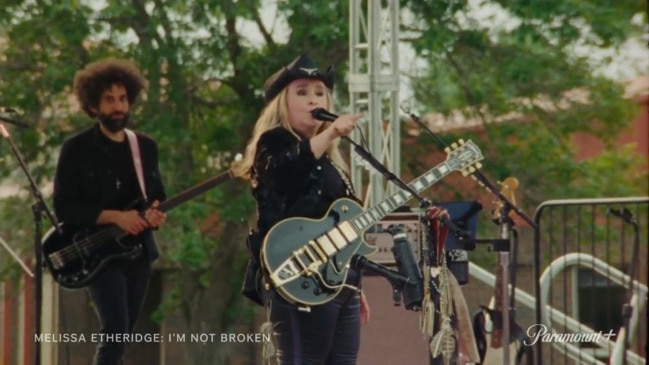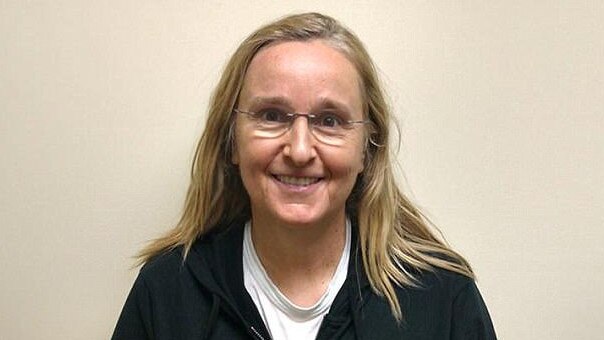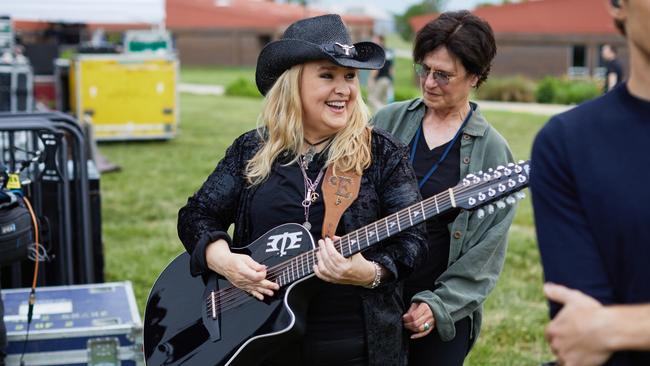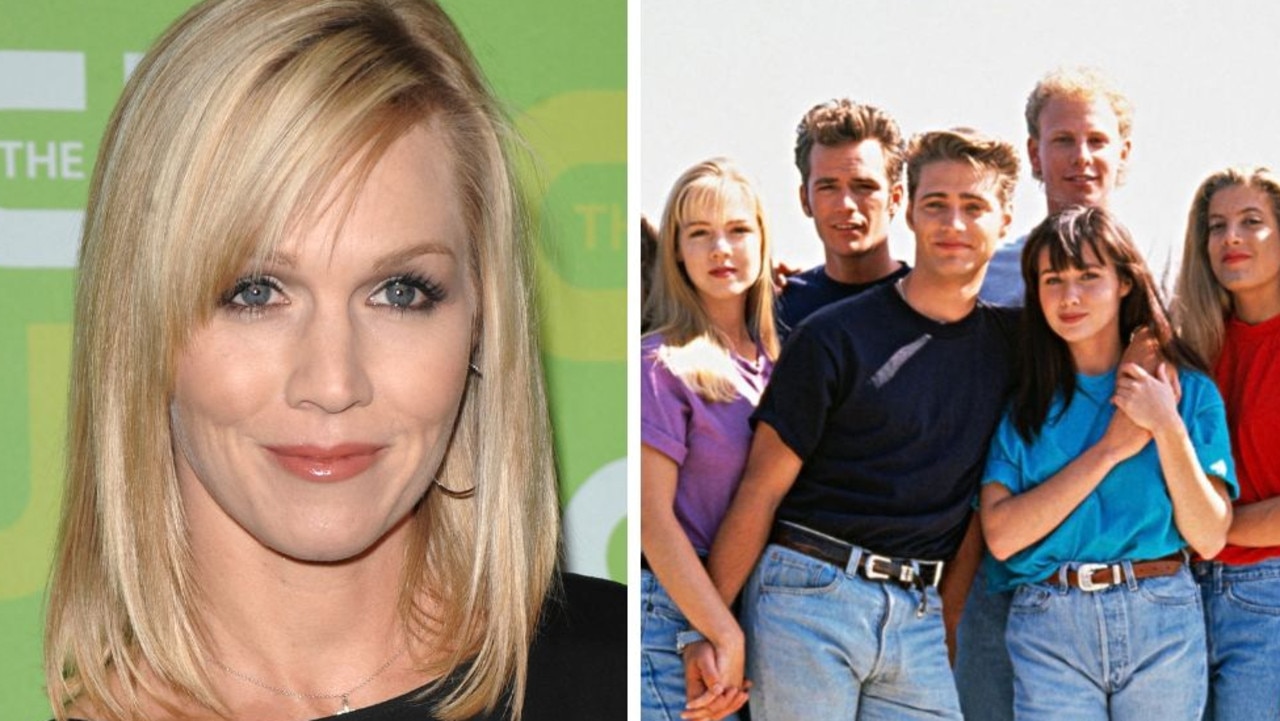Melissa Etheridge on personal tragedy that informed new prison doco I’m Not Broken
Legendary rocker Melissa Etheridge talks to news.com.au about personal tragedy, her ambitious new project and her own brush with the law.

TV
Don't miss out on the headlines from TV. Followed categories will be added to My News.
Rock legend Melissa Etheridge’s latest project was born from a family tragedy: The loss of her 21-year-old son Beckett in 2020 due to causes related to opioid addiction.
The new two-part documentary series I’m Not Broken sees Etheridge speak in detail about the circumstances leading to her son’s death. But the doco, now streaming on Paramount+, also takes a wider focus so that it can strike a more hopeful tone.
Etheridge visits Topeka Correctional Facility, a women’s prison not too far from her hometown in Kansas, to hear some of the prisoner’s stories and perform a concert for them.
Before her visit, she receives letters from the women, and finds their stories have many similarities to that of her son: Addiction, more often than not to opioids, either directly or indirectly landed them in prison.
But these women have the second chance Beckett wasn’t able to get: Many of them are using their time in prison to get clean, better themselves and break the cycle. By the time Etheridge takes the stage in the prison yard for a performance of some of her biggest hits, it’s clear the project has been deeply healing for both Etheridge and for many of the prisoners.

I spoke to Etheridge on the day of I’m Not Broken’s release to talk about the loss of her son, her childhood experiences visiting prison and how her own brush with the law led to an instant entry into the celebrity mugshot hall of fame.
Early on in I’m Not Broken we learn a surprising fact about you: Some of your first public performances as a child happened inside prisons.
Well, I grew up in Leavenworth, Kansas, and it’s a prison town. There’s about five prisons within 20 miles of my house. And so when I was like 12 years old, I joined a variety show that went and entertained the prisons. The audience was always so ridiculously appreciative, you know? They were over the top. It was the first time I had such a huge reaction to what I played and that always stayed in my heart.
Those experiences must have given you a real empathy for people in the prison system at a young age.
Yes, exactly. It did make a big difference. When I realised that everyone in a prison was just like everyone out of the prison, it really hit home that, oh, this is just about choices. And I wanted to just treat them like regular people. And going into this prison [Topeka], I knew that they would be just like people that I know.

You spend some time in I’m Not Broken talking to the prisoners and hearing their stories. Was there anything you learned that surprised you?
Well, it surprised me that they were all mothers. That breaks my heart, because I cannot imagine being forced to stay away from my children. They were very normal, they were very open and they were very kind. I think the biggest thing I came away with was how empathetic they were to me. And that just really says something about the resilience of the human spirit.
One storyline through the documentary is this task that you’ve set yourself to write a song for these women. Was writing a song ‘to spec’ like that a new experience?
It was, and I was very, very conscious about: I didn’t want to patronise, I didn’t want to feel sorry for them; I wanted to give them something that could lift them up and I wanted to speak from their voice. And once I really gave myself those narrow guidelines, I could then put the experiences that I’d heard [into the song]. Like the line ‘hurt people hurt people,’ I heard that in the prison a dozen times. It really is what they’re beginning to understand and how they can break that chain.

The documentary touches on your own 2016 arrest for marijuana possession – and you have what may be one of the most cheerful celebrity mugshots. You look so happy to be there!
When it was happening, the guy who was booking me wasn’t part of the federal guys that were being all macho and teaching me a lesson or whatever. He was the local sheriff, and the last thing he wanted to do was arrest Melissa Etheridge, and so he kept almost kept apologising as we were going through the process.
As he was taking my picture I thought, ‘Wow, this is going to be out there, people are going to find it, it’ll be on TMZ or whatever.’
And I had just rolled off of the bus. I’d been sleeping – I’ve got my pyjamas on basically. Not rock star at all. And when he took the picture, I just thought to myself: You know what? I know that cannabis is medicine. I know that it is harmless in personal use. I just put that in my mind and my eyes and I said, I’m just going to send out love.
You speak very frankly about your son Beckett’s death throughout the doco. Was part of undertaking this project a desire to see some good come out of that tragedy?
Yes, I think I was guided to that. It was pretty devastating, and my manager who knew this was a dream of mine for a long time, she really put herself into high gear in getting this done because I think she knew it would really heal me. And it did, it really did. And this desire for me to just do a concert for prisoners became something deeper and something much more rewarding.

You speak about that tragedy with a lot of resolve through the documentary – but there’s a moment just before you take the stage where you break down in tears. It seemed like that was cathartic.
It was. It was very surprising to me because I had been holding up really well for a while.
We were at the prison, I was backstage with my band, and suddenly I could not hold it back.
My poor band was like, ‘oh my God.’
I did not know that that sort of release was needed, but it was quite an emotional moment for me. And it’s so hard to sing when you want to cry because it just tightens up your throat so much, but I took a breath, gathered myself together and went on with it. It wasn’t like the audience was going to go anywhere.

You came out publicly around the release of your fourth album Yes I Am in 1993 … but those earlier 80s hits like Similar Features and Like The Way I Do were such anthems of queer desire and yearning. Did you feel ‘closeted’ back then, or did it feel like people must know what you were really singing about?
That’s what I really felt. I had been playing in gay and lesbian bars before I was signed, so I was known to be a lesbian ‘underground’. Every show I played, there’d be at least a handful, if not more, of lesbians right in the front. It was kind of obvious if you knew, but back then people just didn’t expect it – they didn’t expect you to come out.
Heterosexual obliviousness?
Exactly! Although I remember someone once said, ‘Oh, that girl’s singing about a woman, nobody sings that way about men.’
It seems like a lot’s changed nowadays. Chappell Roan’s climbing the charts as we speak with a bunch of explicitly lesbian pop songs, right out of the gate.
You have no idea how happy that makes me. I knew in my heart that some day artists would be able to just go, ‘Well, this is who I am.’ And if it was a good song and if people wanted to hear the music, they would not care. Chappell Roan, she’s cool and crazy. Also amazing – and very explicit – is Billie Eilish’s new album. I heard that and I was like, ‘Oh, OK. We’re going there, people.’ I’ve been singing about women for 50 years and even I’m not that comfortable singing songs like that … but you go right ahead!
Melissa Etheridge: I’m Not Broken is streaming now on Paramount +.
Originally published as Melissa Etheridge on personal tragedy that informed new prison doco I’m Not Broken





